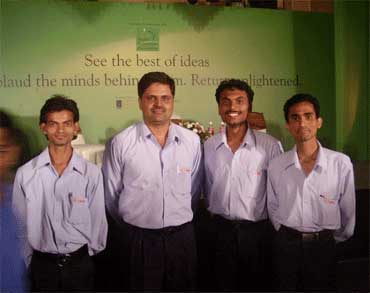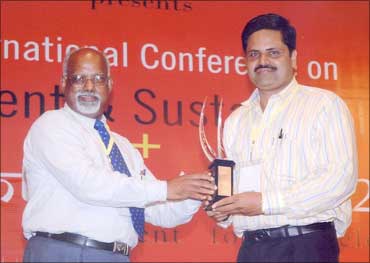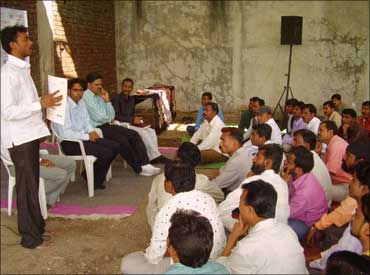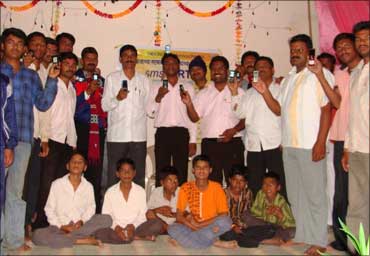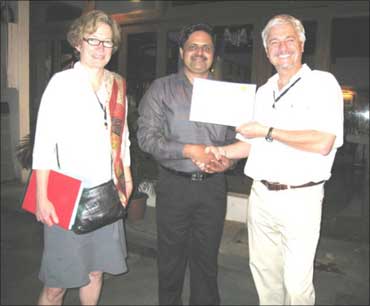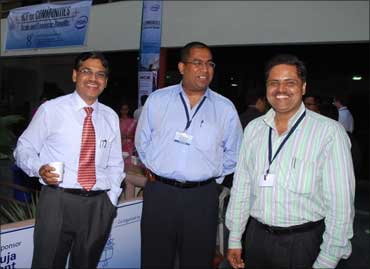 | « Back to article | Print this article |
EduVARTA: Using SMS to educate rural youth!
Ravi Ghate is proud of his academic failure. "12th pass, 2nd year diploma failed," he beams as he introduces himself.
This pride stems from his belief that failure in academics has brought him international acclaim. It is this failure that made him think about millions of Indian youth like himself and the thought led him to create an award-winning, UNESCO-recognised social SMS enterprise called SMSONE.
SMSONE, a Short Message Service-based local community newsletter, uses the basic SMS text to deliver hyper local news in some of the remotest parts of the country.
Ghate appoints unemployed youth in villages as his franchisee reporters. These reporters then go door-to-door signing up people for this service.
Click NEXT to read on . . .
EduVARTA: Using SMS to educate rural youth!
By subscribing to this service, the villagers can get to know of all that is happening in their village through text messages on their mobile phones.
"Since incoming SMS is free, it doesn't cost the subscribers anything. They receive around 10 messages a month on their phone informing them about local politics, crime, events and even the water and electricity situation," says Ghate.
The service has been active for four years in Maharashtra and has now been launched in Tamil Nadu, Karnataka, Andhra and Kerala.
"Considering the current mobile penetration of 70 per cent in India, this idea has a potential of providing more than 600,000 self-employment opportunities in the country as it provides work for one unemployed youth per 1,000 mobile users. Each of these mobile reporters -- or community leaders as we call them -- earns anywhere between Rs 4,000 and Rs 8,000 a month," he adds.
Click NEXT to read on . . .
EduVARTA: Using SMS to educate rural youth!
The community leaders make this money by selling advertisements for this newsletter to local businesses. "We focus on employing failures and school and college drop-outs since they have very little chance of getting jobs otherwise," he says.
This sentiment is also reflected on his visiting card which declares 'From Zero - For Zeroes'.
Currently SMSONE covers 700,000 houses and has 550 community leaders.
It is this vision of cutting through technology barriers and using a basic service like SMS to connect the not-so-privileged to the world around them, that got Ghate noticed internationally.
Click NEXT to read on . . .
EduVARTA: Using SMS to educate rural youth!
The SMSONE service has been widely recognised and applauded around the world since its launch. Ghate was invited to Geneva to present this micro-media model so that it can be replicated in 40 developing countries.
Stanford University wants to take this model to African countries and South America and has been working closely with Ghate to achieve this goal. He has also received Clinton's global initiatives YES fund award, NASSCOM Social Innovation Honor award and stood among the Top 15 best ideas in the world at the N2Y4 mobile innovation challenge in California.
SMSONE has been featured in numerous prestigious publications around the world, including the Washington Post and Techcrunch, the widely read and influential technology blog about start-ups.
SMSONE was also named as one of the five hottest start-ups in India by the Forbes magazine.
Click NEXT to read on . . .
EduVARTA: Using SMS to educate rural youth!
But Ghate is far from resting on his laurels. He has moved on to an area that is in dire need of improvement, especially in the villages.
He now wants to use the same SMS to aid better education. EduVARTA, his new venture, aims to connect school and college going youth in villages to their urban counterparts.
"Students living in remote areas do not have exposure to the outside educational world, skill development initiatives or employment opportunities. Through this service, we are trying to connect these students to their more privileged counterparts in the cities so that they can seek help and guidance from them in shaping their career," says Ghate.
"Not only this, once they subscribe to EduVARTA, these students will also get SMS alerts about college notices and announcements, government decisions, course admissions, trainings, workshops, seminars , scholarships and all the information related to exams and results," he adds.
Click NEXT to read on . . .
EduVARTA: Using SMS to educate rural youth!
Ghate plans to charge the students a nominal fee of Rs 33 annually for this service.
"Since we are catering to the underprivileged through this service we want to keep the subscription affordable. In fact, I have been approached by many investors who are interested in putting in money into this project. But they want us to hike the subscription fees so that it makes better business sense. I have clearly refused to do this and will accept funding for this project only if the cost for the poor students does not go up -- if the social part of this project is not compromised."
EduVARTA also follows the same franchisee model as SMSONE. Ghate appoints franchisees who go to colleges and sign up students.
Click NEXT to read on . . .
EduVARTA: Using SMS to educate rural youth!
However, in this case, since there's a subscription fees involved, the franchisees get to keep Rs 10 out of each annual subscription. But even at Rs 33 a year, Ghate is not sure how many poor students will be able to afford this service.
He is now looking for sponsors who make this service available to 100 students by paying Rs 3,300 a year. He plans to approach Indians in the Silicon Valley for this purpose.
"Rs 3300 a year will be a negligible sum for these affluent Indians and I feel that they would surely want to give back to their country where they received the education that helped them prosper in life," he says.
What about big multinationals who are spending millions of dollars in developing and marketing education related applications for smart phones? Does Ghate feel threatened by these?
Click NEXT to read on . . .
EduVARTA: Using SMS to educate rural youth!
"All these applications are for the rich. To start with you need to spend a minimum of Rs 5,000 on a mobile handset to use these applications, not to mention the cost of Internet access and downloads. I want to help people who have a 1,000-rupee handset and no access to the Internet," he explains.
It is this basic instinct of helping the poor that separates Ghate from the other new age entrepreneurs. A social entrepreneur, as he calls himself, Ghate is well aware that the increasing buzz around smart phones, 3G connection and cutting-edge applications has no meaning for people in the villages who are struggling to make two ends meet.
He is therefore keen on using that one mode of communication that most of them possess -- a basic mobile phone -- to improve the quality of their lives.


